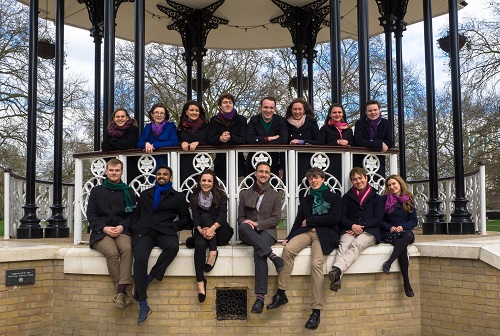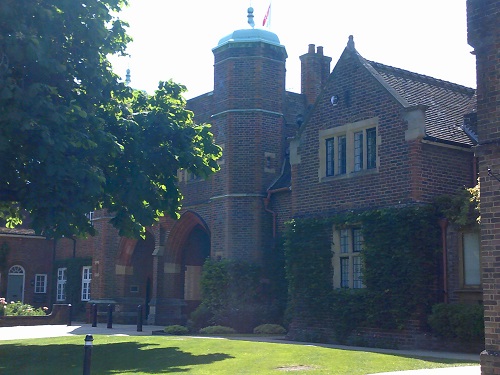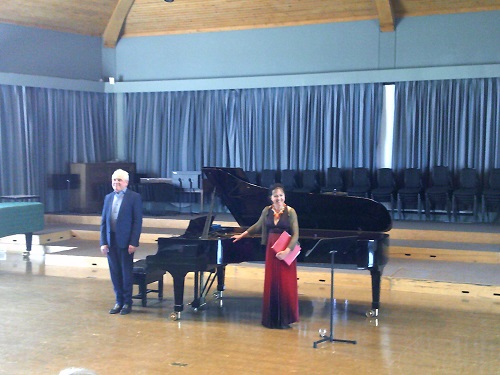Warm summer sunshine, a long bank holiday weekend, four days of English music in a lovely Oxfordshire village among convivial company: what a treat. Well, the holiday exodus from the capital, and motorway madness, accidents and logjams, thwarted my efforts to get to the opening night of the sixteenth English Music Festival, in Dorchester-on-Thames, so sadly I missed a characteristically innovative and inspiring programme by the BBC Concert Orchestra, conducted by Martin Yates, which included no less than four world premiere performances – Paul Lewis’s A Celebratory Overture, William Lloyd Webber’s Scenes from Childhood, William Alwyn’s Serenade for Orchestra and Vaughan Williams’ A Road All Paved with Stars – as well as Moeran’s Cello Concerto played by Raphael Wallfisch.
But, the following day the roads were as clear as the skies, and so I was delighted to find myself seated in Dorchester Abbey for the evening concert – a performance by The Holst Orchestra and the Godwine Choir, under the baton of Hilary Davan Wetton.
The programme balanced familiar favourites and little-known fare, drawn from the first half of the twentieth century. Sir George Dyson’s Four Songs for Sailors were shown to be more sophisticated than one might anticipate. Rocking motifs in the orchestra propelled ‘To the Thames’ (words by Sir John Denham) with flowing stature, while Arthur Hugh Clough’s reflections of seafarers’ homesickness in ‘Where Lies the Land?’ had a lovely vigour, the impetus of the tread in the bass complemented by the tossing of phrases back and forth among the choral voices and busy fiddle playing. Davan Wetton skilfully and coherently shaped the competing strands. ‘Sea Music’ depicts Longfellow’s vision of the sea beneath the star-flecked night sky, and here the gentle lyricism of the strings evoked the ‘breathless silence’ in which the heavens listen to the ocean’s ‘solemn litany’, as conjured by Dyson’s nuanced harmonies and textures. Davan Wetton held the choir’s final ‘Christe eleison’ at the end, the ghostly choirs’ response to the sad, unceasing voice that ‘sings on’. ‘A Wet Sheet and a Flowing Sea’ was hearty of soul, its spirit of contented camaraderie balanced by the elegance of the performers’ execution.
Cecil Armstrong Gibbs (1889–1960) was a champion of amateur music-making in England and his Miniature Dance Suite Op.124(1949) was one of the many eminently performable works that he composed for choral societies, schools and amateur ensembles. The ‘March’ was robust, though contrasts were crisply delineated, the ‘Quick Minuet’ tuneful with varied textures and counterpoint – and some expressive pianissimo playing, nicely wrought by Davan Wetton. After a perky ‘Graceful Dance’, with its mischievous fugal episode, the ‘Sarabande’ was grave but flowing. The concluding ‘Jig’ isn’t a wild romp, but, while carefully observing its dynamic contrasts, Davan Wetton brought out its cheery playfulness.
There were some a cappella items, too. John Ireland’s part-song, The Hills (1953) was composed for a concert at the Royal Festival Hall on the eve of Queen Elizabeth II’s coronation, and sets a text by James Kirkup, the constancy and impenetrability of the hills, ‘earth’s enduring thrones’, presumably intended to suggest similar qualities virtues in the monarchy upon with the nation and commonwealth was built. It was superbly sung by the Godwine Choir, the words carefully enunciated in beautiful homophony, the phrasing and frequent falling suspensions gracefully sculpted by Davan Wetton, who made the breaks and breaths flow with naturalness. There was both stillness and majesty, as the men’s observation, ‘And their profounder rivers run/ From rocks that are the altars of the sun’, blossomed into richly coloured ensemble singing.
Ralph Vaughan Williams’ Valiant-for-Truth (1940) was no less affecting and deeply felt. The text comes from the last part of John Bunyan’s Pilgrim’s Progress, in which Mr Valiant-for-Truth, scarred and battle-weary, reaches the end of his pilgrimage. Davan Wetton again coaxed some truly expressive pianissimo singing from the Godwine Choir, making the vigorous richness of the declaration, ‘My sword, I give that shall succeed me in my pilgrimage’, all the more thrilling. As death approached and he ‘went down deeper’, the heartfelt fullness of the choral sound lifted his soul up, ‘as all the trumpets sounded for him on the other side’, the Amens resounding and true.

Best of all, though, was Herbert Howells’ Requiem. What a beautiful work this is. The composer began writing it in 1932 for the Choir of King’s College, Cambridge, but it was never published, and it was fifty years before the manuscript was re-discovered, prepared and finally published. Perhaps it was the death of his only son Michael in 1936, from polio at the age of nine, which prevented Howells from making the work public.
Howells does not follow the traditional Requiem liturgy, instead assembling varied texts. Here, the opening Salvator Mundi began with stillness and darkness, but gradually lifted and strengthened, the rich ensemble blend cohering wonderfully. In Psalm 23, the crystalline female voices were complemented by a choral unison, ‘Yea, though I walk in the valley of the shadow of death’, that swelled gloriously, with impassioned sincerity and belief, the final declaration, ‘I will dwell in the house of the Lord forever’, having a chant-like certainty. In the first of two settings of Requiem Aeternam, Davan Wetton shaped the Renaissance-influenced polyphony deftly, bringing individual voices to the fore and then settling them back into the texture, emphasising the opulent harmonies with sensitivity. Again, the ending made a strong mark, the low ensemble register deliciously comforting. The second setting, with its strong tenor solo, suggested spiritual profundity. In Psalm 121, Davan Wetton encouraged a telling restraint; the final movement, ‘I Heard a Voice from Heaven’, had a meditative assurance.
The concert had opening with Elgar’s Introduction and Allegro for strings. Davan Wetton’s big strokes, side sweeps and slightly twitchy baton injected dynamism into the Introduction, but he did not neglect the lyricism, and the violas’ statement of the theme was tender. There was a real sense of ‘release’ into the Allegro: this was terrific string playing, the tone sweet, the textures clear – the Abbey acoustic again played its part, and the fairly small ensemble produced a glowing, full sound. The solo quartet passages drove forward, and Davan Wetton conjured excitement in the fugue – indeed throughout there was vigour and thrust, particularly in the recapitulation. A full-blooded pizzicato flourish brought this wonderful work to a close.
The sense of innovation and freedom at the start was balanced by tradition and calm at the close. Holst’s Two Psalms (1912). Psalm 86 may begin, ‘To my humble supplication,/ Lord, give ear, and acceptation’, but – following a searching, atmospheric string introduction – it developed here into an anthem of stature, with the chorus alternating with tenor and soprano solos. Holst’s setting of Psalm 148, ‘Lord, Thou Hast Made Us for Thine Own’, is no less substantial, the familiar melody, ‘Lasst uns Erfreuen’, treated imaginatively. Davan Wetton coaxed the choral voices in swelling majesty as the basses sang the tune in augmentation beneath the elaborations above. The closing Alleluias built joyously and exuberantly, creating a mood of shared celebration and rejoicing.

Earlier in the afternoon, a short drive had taken me through some pretty Oxfordshire villages to Radley College where, in the Silk Hall, soprano Sarah Stowe and pianist Charles Wiffen presented a programme of English song and music for piano built around the music of Walter Leigh (1905-42), who was killed in World War II. Stowe has a fairly lightweight soprano, and while it is sweet of tone, the lack of ‘body’ and support sometimes inhibited her projection of the climaxes of the songs, and affected her intonation. But, she has an engaging manner of delivery and articulated the texts cleanly and clearly. Wiffen demonstrated a perceptive appreciation of the tenor of the varied texts and settings, consistent technical assurance, and real commitment to the works performed.
Stowe was best in the works of lighter spirit and narrative tone. Cecil Armstrong Gibbs’ Two Elizabethan Songs Op.44 (1922) blend Renaissance modality with a mild modernity. ‘Love is a sickness’ is a surprisingly chirpy setting, and Stowe made the repeated questions and exclamations, ‘Why so?’, ‘Heigh ho!’, bright and animated, while Wiffen’s light-fingered accompanied added to the simplicity and directness of ‘In youth is pleasure’. Gibbs’ Three Lyrics (1952) set three poems by Christina Rossetti, and Stowe displayed clarity of expression and sensitivity to the texts. In ‘The Lamb and the Dove’ she worked hard with the words, above the piano’s parallel movement, though both here and in ‘A Birthday’ she struggled to make Gibbs’ melodic climaxes vocally convincing. Wiffen’s supportive accompaniment and nuanced colourings sensitively enhanced ‘Winter’.
We had two of Britten’s realisations of Henry Purcell, ‘Celemene’ and ‘The Knotting Song’, the latter particularly charming. And we wandered off the beaten track for Three Epigrams by the South African-born Priaulx Rainier (1903-86) who in 1920 won a scholarship to the Royal Academy of Music, settled in London and earned a living as a violinist and teacher. In 1937, the year in which the Greek Epigrams – which set texts by Anyte of Tegea, as translated by Richard Aldington – were composed, Rainier studied with Nadia Boulanger in Paris. The duo captured the translucence of the songs which Stowe sang with composure. The limited vocal movement, above motivic repetitions, in ‘A bird’ surged unexpectedly with the image of human cruelty, ‘And killed you’, and was followed by pointed, unaccompanied directness: ‘pressing his finger into your throat.’ Wiffen’s busy unisons in ‘For a Fountain’ provided a well-delineated bed above which the vocal line could float. ‘Dolphin’, with its high vocal melody and low piano register, was finely crafted.

Between the vocal items, Wiffen presented diverse piano works. The impressionist colour-scape of the two Diversions by Robin Milford (1903-49) was deftly painted. The first and last of Doreen Carwithen’s Four Preludes (1950) impressed with their characterful presence. No.1 circled hypnotically in the upper register, droplets falling into water, before sinking into contemplation; in No.4, lively interjections jabbed at jazzy rhythms, the two hands in dancing dialogue. In Britten’s challenging Notturno, Wiffen delineated melody and textured accompaniment with assurance and sensitivity.
And what of Leigh, then, whose music formed the backbone of the recital? Well, the visual imagery of Three Machine Dances (1924) was striking, the first dance (‘Pompous and strictly rhythmic’) a mosaic of pistons, wheels, valves and conveyor belts, the second (‘With clattering precision’) exciting one’s aural sense, and the third (‘Jerky and emphatic’) kinetically stimulating, with bell-like sonorities that resounded thrillingly at the close.
Of the songs, we heard Three Roundels in which Stowe was impressively off-score. She captured the somewhat folky quality of the vocal line in the first song, and negotiated the angularity of the second. Wiffen’s accompaniments were richly textured and flowing. ‘Why have you stolen my delight?’ and ‘June’, both composed in 1925, demonstrated what one might call Leigh’s ‘neoclassical’ leanings: the latter also presented the text most expressively, the piano’s repeating motive suggesting the ‘white clouds … in the breezy sky’, the tumult of the close evoking the delight experienced ‘when June is come’. ‘The Hill Pines’ and ‘A Parting’, also from that year, presented Leigh in a more pastoral mode.
For me, most striking of all was Leigh’s Piano Sonata (1926). The dense first movement, Moderato, with its repeating figures in the bass, had power and resonance, the weight of the chordal writing and registral extremes making a case for the work’s stature. The Adagio was characterised by a shifting elusiveness, as if searching for its direction and gradually finding its way, later developing heated arguments. Vivo was a breathless perpetuo moto which Wiffen dispatched with impressive clarity – the bass particularly well-defined and crisp – and explosive vigour. Wiffen’s most persuasive account of this interesting Sonata made one eager to hear more of Leigh’s music.
Claire Seymour
Sarah Stowe (soprano), Charles Wiffen (piano)
Walter Leigh – Three Roundels, Piano Sonata; Robin Milford – Diversions; Priaulx Rainier – Three Epigrams; Cecil Armstrong Gibbs – Two Elizabethan Songs; Purcell (arr. Britten) ‘Celemene’, ‘The Knotting Song’; Gibbs – Three Lyrics; Vaughan Williams – ‘Silent Noon’; Leigh – ‘Eclogue’, Three Machine Dances; Doreen Carwithen – Preludes No.1 and No.4; Leigh – ‘Why Have You Stolen My Delight?’, ‘June’; Britten – Notturno; Leigh – ‘The Hill Pines’, ‘The Parting’.
Silk Hall, Radley College, Oxfordshire; Saturday 27th May 2023.
The Holst Orchestra, The Godwine Choir, Hilary Davan Wetton (conductor)
Elgar – Introduction and Allegro; Howells – Requiem; Dyson – Four Songs for Sailors; Cecil Armstrong Gibbs – Miniature Dance Suite; Ireland – The Hills; Vaughan Williams – Valiant-for-Truth, Holst – Two Psalms.
Dorchester Abbey, Dorchester-on-Thames, Oxfordshire; Saturday 27th May 2023.